
To see this article in its original form, visit Authentic Voices of Pride, a special project sponsored by Chevrolet at LGBTQ Nation
For a book-smart kid who enjoys board games and dreams of traveling to nurture his love of history and culture and who grew up in a conservative neighborhood, leading a statewide student walkout may have seemed an unlikely turn of events.
But that’s exactly where Florida teen Jack Petocz found himself earlier this year — at the epicenter of a battle for LGBTQ student rights, representation, and visibility.ADVERTISING
Like most teens on social media, a 17-year-old student at Flagler Palm Coast High School, first learned about Florida House Bill 1557 – which opponents refer to as the “Don’t Say Gay” bill — as objections to it reverberated across social media after its introduction in January.
“It was all over my Twitter feed,” Petocz told LGBTQ Nation in an interview from his home in Flagler County, Florida.
For a lot of young people, the objections would have stopped with a social justice Tweetstorm. For Petocz, it was just the beginning of a real-time mobilization in which he would quickly become a student leader, recognized across the nation for his political acumen and courage.
“Students were asking for advice on how to organize their own rallies and how to deal with school administrators. So very quickly, it got really big.” — Jack Petocz
Petocz believed instinctively from the hard experience of coming out to his family and classmates that House Bill 1557 was wrong. The “Parental Rights in Education” bill bans classroom instruction on “sexual orientation or gender identity” in kindergarten through grade 3, which effectively outlaws students or teachers from talking about something as commonplace as same-sex parenting or marriage.
“I started by retweeting, but then I read the bill and got into the nitty-gritty of it and felt like I needed to take tangible action,” Petocz said. “At first, I was just planning to organize a student walkout in my school district, but as soon as I put out the flyer on Twitter and Insta, I was flooded with DMs from all over the state. It was kind of overwhelming. Students were asking for advice on how to organize their own rallies and how to deal with school administrators. So very quickly, it got really big.”
Soon, students statewide were inspired to get involved, organizing their own walkouts in communities from Delray Beach to Tampa and Orlando. On March 3, more than 500 students participated at Petocz’s school alone.
Palm Coast High School, with more than 2,500 students, is located about 25 miles north of Daytona Beach in a conservative pocket of the state, which has increasingly leaned right in recent elections. Over half of the county’s population is 50 or older, with economic development focused on healthcare. The next generation of residents, led by young people like Petocz, is championing a more inclusive agenda.
“My own school’s administration was initially very supportive,” he said. “They were like, ‘We’re happy to encourage students to voice their opinions.’”
But then the tone shifted.
“I’d bought a couple of hundred miniature Pride flags with my own money, and the principal said we couldn’t pass them out, that they were political and divisive,” Petocz said. “I said, ‘Sir, this is a symbol of inclusivity,’ but he told me they were a danger to our school. Come on! We’re allowed to have cell phones in classrooms — that’s certainly more dangerous than a flag.”
Jason Wheeler, community information specialist for Flagler Schools, responded by email to a request for comment from LGBTQ Nation. “Student leaders were told ‘no flags’ prior to and at the beginning of the event so as to avoid undue safety concerns and campus disruptions,” he wrote. “This is laid out in our Student Code of Conduct, which prohibits items not required for school/educational lessons.”
Despite the school administration’s growing crackdown on dissent, the walkout and protest went on, and the school board suspended Petocz, citing his insistence on distributing the rainbow flags.
Petocz’s suspension was reversed after an online petition gathered over 7,500 signatures in a matter of hours.
Governor Ron DeSantis, widely thought to be a Republican presidential aspirant, signed the “Don’t Say Gay” bill into law on March 28.
Just over two weeks later, Petocz shared via Twitter that administrators had placed a “Level 3 disruption” offense on his record, which he indicated would prevent him from pursuing leadership roles in most school clubs, such as past involvement in student government and Leo Club, the youth branch of Lions International humanitarian organization.
Despite his seemingly overnight rise to prominence as a student leader, this wasn’t Petocz’s first dance with a megaphone. He had challenged Flagler County’s school board in November, when member Jill Woolbright attempted to remove four titles, including the young-adult memoir All Boys Aren’t Blue by Black, queer, nonbinary author George M. Johnson, from school libraries. The book, which explores what it’s like to grow up Black and queer in America through a series of personal essays, is in an American Library Association Rainbow list pick and received more than a dozen similar recognitions. Yet, the title has been pulled from libraries or challenged in nearly 20 states, according to Johnson.
Petocz’s response included not only leading protests outside a school board meeting but calling for book donations to distribute the titles in question to students who wanted to read them.
In recognition of his efforts, PEN America, a literary and human rights organization, honored Petocz with the 2022 PEN/Benenson Freedom of Expression Courage Award on May 23.
“Jack Petocz is leading his generation in fighting back against book bans and legislative efforts to police how individual identities can be discussed in schools,” Suzanne Nossel, chief executive of PEN America, said in a statement in April, adding, “An ardent champion of LGBTQ rights and freedom of expression, Jack’s advocacy exemplifies how the causes of civil rights and freedom of speech are inextricably intertwined.
Undeterred by political setbacks, Petocz said that he and his fellow youth leaders see plenty of hope ahead, supporting legal efforts to overturn the education law and, more broadly, pursuing strategies to elect candidates who support the LGBTQ community in the 2022 midterm elections.
According to the Movement Advancement Project, a nonprofit think tank that uses data to create visual resources for civic engagement, six states have laws censoring the discussions of LGBTQ people or issues in school with many more attempting to advance similar legislation. Yet Petocz’s efforts — and those of similarly minded young leaders — are not solely reactionary.
Recent research about grassroots LGBTQ activism from The Journal of Homosexuality indicates that the kind of activities Petocz and his peers engage in can also help develop resiliency and other positive traits to carry through to adulthood.
“An ardent champion of LGBTQ rights and freedom of expression, Jack’s advocacy exemplifies how the causes of civil rights and freedom of speech are inextricably intertwined.” — Suzanne Nossel, chief executive officer of PEN America
“My team’s recent research suggests that creating and joining grassroots activism organizations provides people with opportunities to address social problems and boost their own well-being,” said Travis Scheadler, one of the article’s authors, to LGBTQ Nation. “Our collective advocacy may be exactly what we need to protect our rights and our lives — and may even help us grow as individuals, friends, and communities, strengthening our agency, life purpose, hope, identity, and overall well-being.”
LGBTQ Nation caught up with Petocz between honors classes, extra-curricular activities like the Future Problem Solving Program International, hanging out with friends, playing board games, and binge-watching the Netflix series Heartstopper, for a conversation about the motivation for his activism, how he thinks his generation is unique, and his hopes for the future.
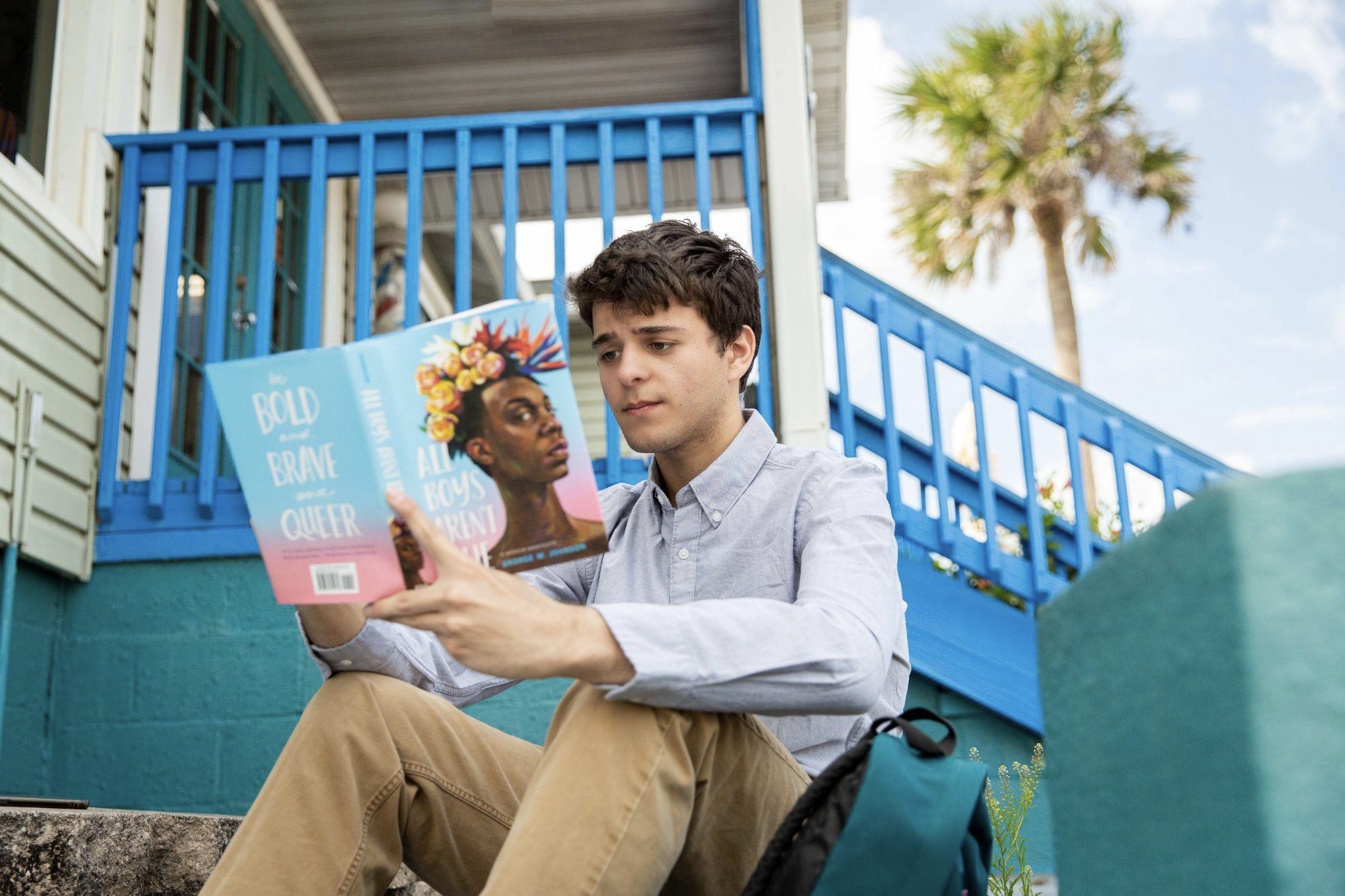
How do you think your upbringing inspired you to become a leader at such a young age?
To be honest, I’m sort of a lone wolf. I’m the fifth of six siblings, ages 16 to 26, but none have ever really been politically active. My mom works in health care — she was a pharmacy technician and is now training to be a medical assistant — and my dad has some health-related disabilities. That has led me to think about some of the attacks that have been made on Social Security and health-care benefits and how policies could affect my family.
But my parents are more conservative than I am. They’ve always been supportive, though, and respectful of my beliefs. Once in a while, if I have to miss dinner because I have a meeting, someone will tease me, like, “Oh, Mr. Celebrity’s too busy for us.” But really, they’re good with everything. I’m lucky.
When did you realize you were different from other kids?
I think that starting to understand that I was gay in middle school, and then having a really diverse group of friends in high school led me to educate myself and start to get involved in activism.
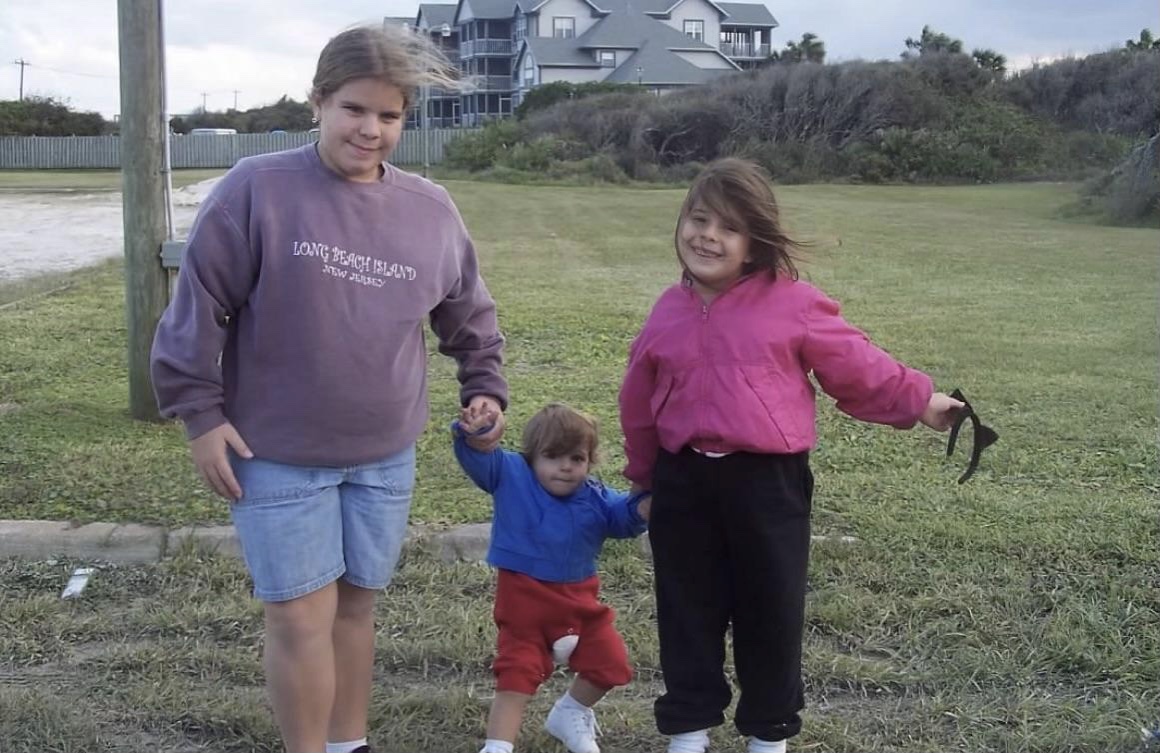
What was it like to come out in the conservative area of Florida where you live?
I didn’t actually know any gay adults when I was growing up. But I did have social media, and that was incredibly valuable to me. The internet helped me find the courage to come out and embrace a gay identity. In middle school, I watched a lot of YouTube videos by guys like Tyler Oakley, Connor Franta, and Joey Graceffa. I finally told a couple of friends, and they were very accepting. I came out to my parents in my freshman year of high school. I’m very fortunate that they have always been completely accepting of it.
When the Supreme Court legalized gay marriage in 2015, I was 11. I remember seeing that on TV and looking over at my father, and he was smiling. I already knew I was different in some way without attaching the word gay to it yet, but that was amazing.
Are there other events in your lifetime that felt like historical milestones for you as a queer person?
The next year, after marriage equality, was the shooting at the Pulse nightclub. I’d lived just an hour from there. I still wasn’t out, but that felt terrifying. It was important that I heard my parents talking about how awful it was that members of the LGBTQ+ community were being targeted. I think that Pulse started to pull people together and give them a sense of solidarity against homophobia.
“When the Supreme Court legalized gay marriage in 2015, I was 11. I remember seeing that on TV and looking over at my father, and he was smiling. I already knew I was different in some way without attaching the word gay to it yet, but that was amazing.” — Jack Petocz
How have your classmates inspired your interest in social justice?
I’m in a program called the International Baccalaureate at my high school. It’s a track for your whole four years that you apply for and test into before ninth grade. It’s pretty rare to have it offered in a public school like mine. It’s much more common in Europe and Asia. If you look at our community overall, it’s pretty much white and middle class, but there are a lot of transplanted kids in the program whose families moved here from elsewhere.
My close friend Genesis was born in Puerto Rico, and she’s told me so much about the aftermath of Hurricane Maria. Her family really had a sense of being abandoned by the U.S. government. And my friends who came here from India, they didn’t grow up with so much that we just take for granted here. Listening to their stories has made me think a lot about privilege and fairness.
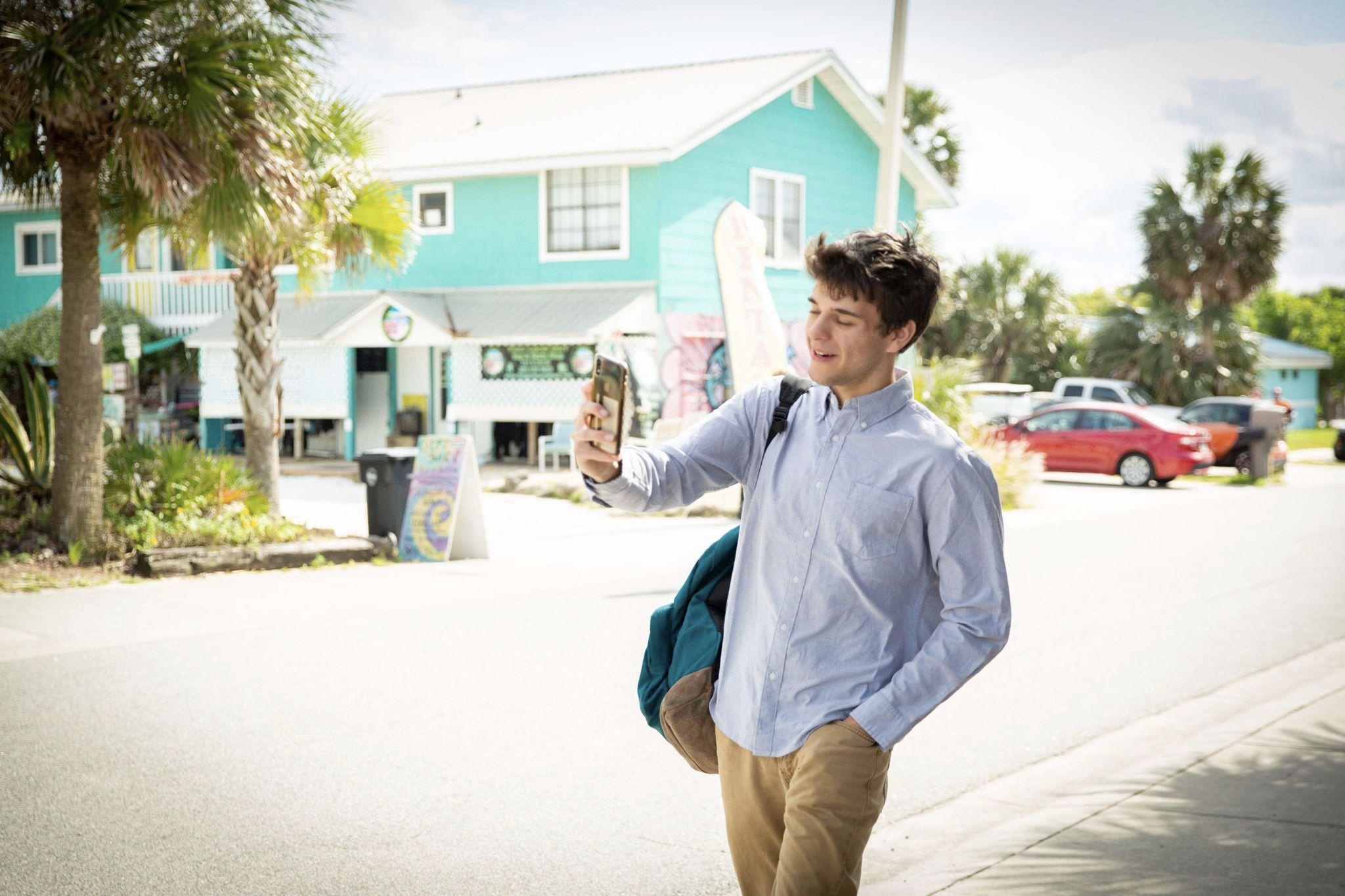
Are LGBTQ rights going to continue to be your main focus when it comes to activism?
That’s something that’s particularly personal to me, of course, but the book ban that we protested at my school was related to racial issues as well as queer issues. Some of the same conservative parents and school board members that are against LGBTQ content also are very critical of what they say is critical race theory, but is really just trying to legitimate discrimination against people of color.
And there are so many other issues that I want to help bring attention to: Climate change, and, after seeing Governor DeSantis’ policies on Covid, public health issues. After the book ban protest, I joined Gen-Z for Change, and now I’m working with them as a political strategist in advance of the 2022 elections, looking at all the races nationally and helping decide which candidates to support and what to ask of them.
I think it’s fine to have a niche to specialize in: For me, it’s queer issues; for my friend Alysa Vidal it’s climate change because she lived in California for the wildfires. But one of the great things about the Gen-Z online community is that we expose each other to different issues and help educate each other. I find David Hogg inspirational because he got so involved in helping with the “Don’t Say Gay” protests, but his niche, of course, is gun control because of his experience at Parkland.
“One of the great things about the Gen-Z online community is that we expose each other to different issues and help educate each other.” — Jack Petocz
Online interaction is a major part of activism for your generation. Do you feel like communicating via social media is genuinely effective?
Online outreach is an incredibly valuable asset. You can reach millions of people all across the world in a matter of hours. I’m incredibly grateful to have social media as a tool. Back in November, when we had the book ban, I put out a request for copies of the banned titles to distribute to kids who wanted them, and I was sent like 300 books.
But there’s something really different about in-person activism. There’s a certain energy to taking part in a protest or a rally that’s so emotional and inspiring. You don’t feel that sense of collective spirit when you watch the number of likes go up on a social media post. It’s amazing to feel surrounded by people who are passionate about the same issues as you, and that helps give everyone the energy to keep at it.
Pretty much all the organizing and information sharing we’ve done in Gen-Z for Change has been online, and it’s been great. But this summer, around a dozen of us will be spending a month brainstorming and working together in person in Washington, D.C. I’m super excited about that.
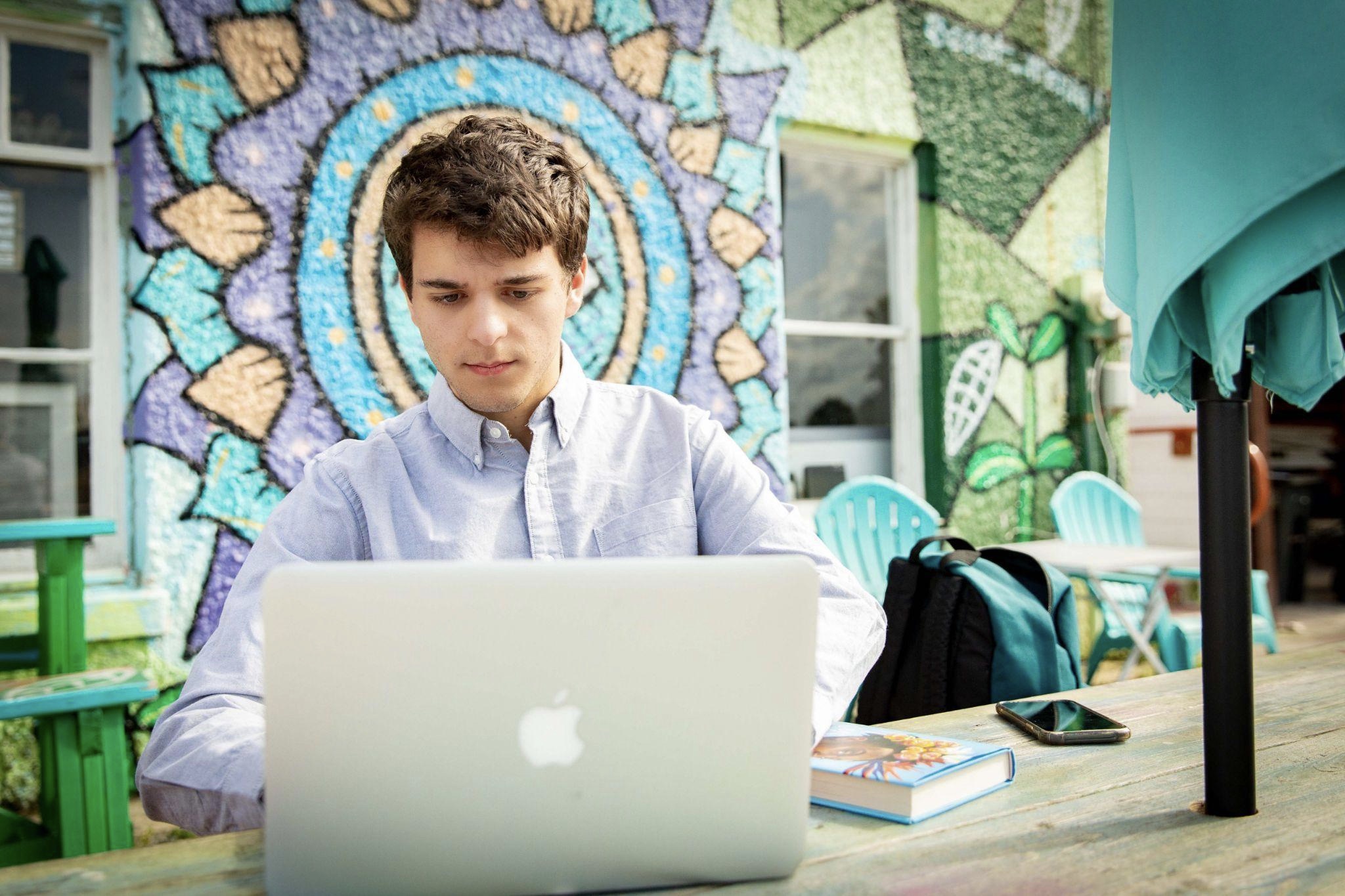
Are there any downsides to using social media for community organizing?
Information moves so fast. Back in November, when I was organizing against the book ban, it was a really scary time. The alt-right saw our posts about our protest plans and began circulating information about it in their online forums and on Twitter. I mean, we’re students protesting about books in our high school, and it got so much bigger so fast. There were a lot of white nationalists who came to the protest, people in body armor carrying assault rifles, trying to intimidate us. I mean, three people drove down all the way from Virginia.
These are adults traveling from a distance to say these things to minors at their own high school. I have a video of someone calling one of my friends a racial slur. They followed us to our cars, trying to intimidate us, pushing against a barricade set up to protect us.
How did you deal with that?
I’m really proud that we never stooped to their level by engaging or giving them much of a reaction. We just turned up our mic a bit louder and just continued to try to get our message out there.
You’ve received a lot of media coverage for your activism. Are you comfortable being in the spotlight?
It can be pretty overwhelming. Being suspended from school for protesting the “Don’t Say Gay” law and all the attention that came from that was a lot for me. I wasn’t sleeping much; I was constantly working. Having all those eyes on you and people looking to you for responses. And I feel terrible when I can’t get back to everyone who reaches out to me on social media. But I’m so thankful for the platform I have now. That I can be a voice.
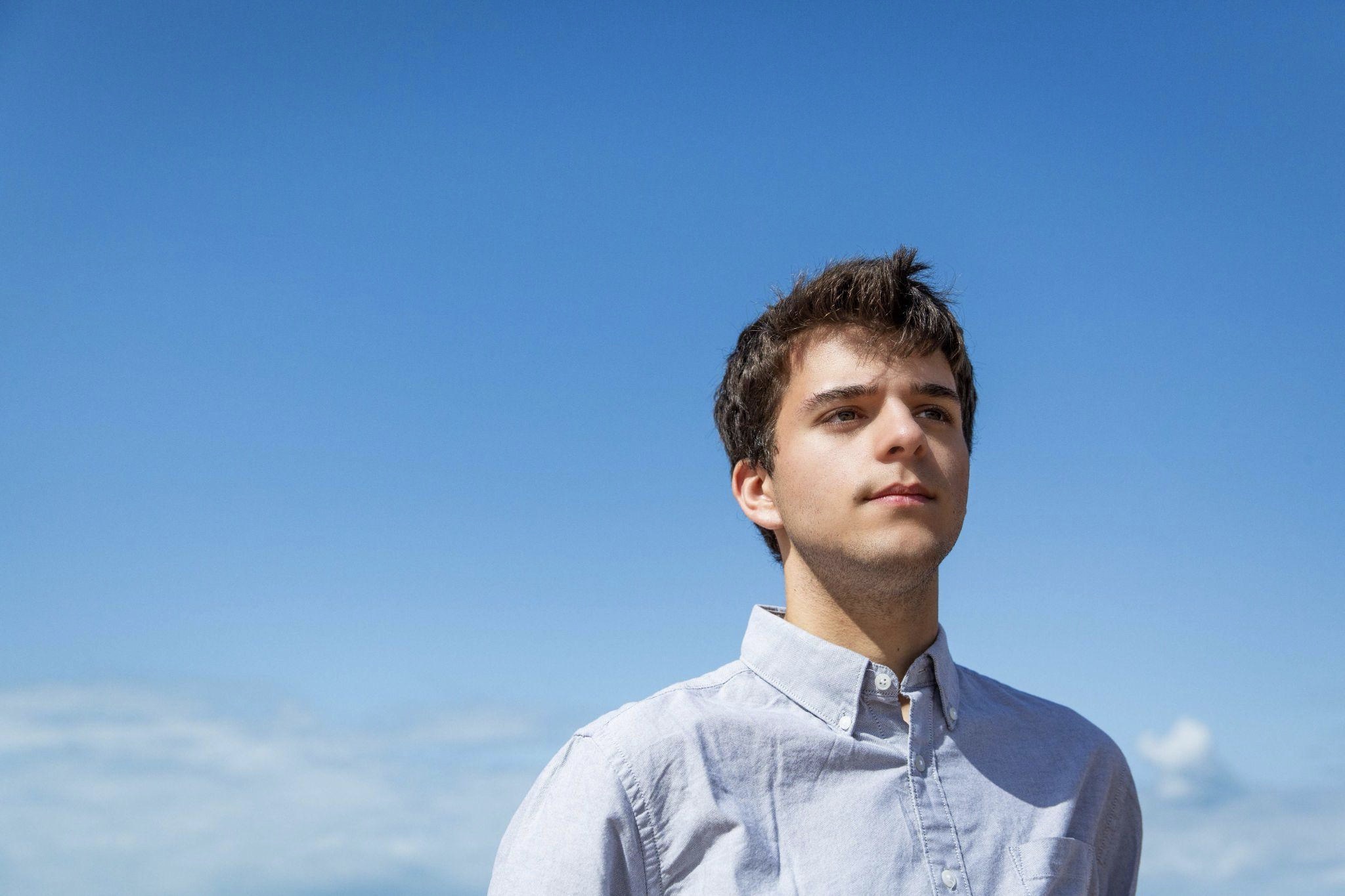
Besides being digital natives, do you feel like you and your peers are fundamentally different from prior generations?
I do. I think that Gen Z has experienced so many challenges growing up. We were born in the wake of 9/11 — in wartime. We saw our families go through the financial crisis and recession. We’re going to school at a time when mass shootings have been on the rise. And then came Covid. Do you realize how much impact that has had on the lives of middle school and high school students, having two years of opportunities and education disrupted like that?
Do you think that the pandemic became a catalyst?
In my school for sure. Having grown up with technology, when we want to educate ourselves about something, it can happen fast. We were all spending more time online, and we would see politicians and school board members peddling misinformation about Covid and masking. Meanwhile, the principal of our school died from Covid. So a lot of the students got really upset about the politics of the pandemic.
“I got a call and didn’t recognize the number. When I answered, it was the White House! I was like, is this a prank?” — Jack Petocz
How do you react to suggestions that youth leaders are being influenced by politicians rather than honestly expressing their own opinions?
That really surprised me. Locally, they’ll say we’ve been indoctrinated by candidates running for the school board because we’re trying to recall current board members. But it’s not true at all; it’s entirely student-driven. We might seek an adult for guidance or advice sometimes, but all of the decisions are made by students.
Then, statewide and nationwide, people definitely try to discredit student activism by saying our groups are backed by lobbyists.
At the end of spring break this year, I got a call and didn’t recognize the number. When I answered, it was the White House! I was like, is this a prank? But they explained that the secretary of education, Miguel Cardona, and Admiral Rachel Levine, assistant secretary for health, wanted to arrange a Zoom call with myself and other Florida students involved in the “Don’t Say Gay” walkout. And it was a real listening session. They wanted to know about what we were experiencing and what we needed to feel comfortable in our schools.
It’s pretty amazing to get to talk to people at that high a level and be listened to with respect. But afterward, there were people who said that we’re on the Biden administration payroll and things like that. These statements are inflammatory when you put so much work into an issue. I’m dedicating so many hours to these causes in addition to school, my job, and my extracurriculars. Not giving us credit for all the hard work we do is disrespectful. To hear politicians describe us as pawns is really upsetting.
What do you see in your future?
Well, first I have to get into college! I want to study government and political science.
I understand that going into politics has been stigmatized over the past couple of generations because so much of it seems so corrupt. Kids in Gen Z have seen STEM [science, technology, engineering, and math] more emphasized in school, and those careers are talked about as very prestigious. But I think things may be starting to change because of all these experiences we’re talking about.
I might want to run for office someday.
